- Home
- Philip Donlay
Aftershock: A Donovan Nash Novel (A Donovan Nash Thriller)
Aftershock: A Donovan Nash Novel (A Donovan Nash Thriller) Read online
AFTERSHOCK
Also by Philip Donlay
The Donovan Nash Novels
Deadly Echoes
Zero Separation
Code Black
Category Five
AFTERSHOCK
A Novel
PHILIP DONLAY
Copyright © 2015 by Philip Donlay
FIRST EDITION
All rights reserved. No part of this book may be reproduced in any form or by any electronic or mechanical means, including information storage and retrieval systems, without permission in writing from the publisher, except by a reviewer who may quote brief passages in a review.
This book is a work of fiction. Names, characters, businesses, organizations, places, and incidents either are the products of the author’s imagination or are used fictitiously. Any resemblance to actual events, businesses, locales, or persons, living or dead, is entirely coincidental.
ISBN: 978-1-60809-139-3
Published in the United States of America by Oceanview Publishing Longboat Key, Florida
www.oceanviewpub.com
10 9 8 7 6 5 4 3 2 1
PRINTED IN THE UNITED STATES OF AMERICA
For Rebecca “Bex” Norgaard Peterson
There’s not a single scenario where I get to where I am today without you in my life. You have my eternal thanks.
ACKNOWLEDGMENTS
A heartfelt thanks goes to the gracious people I met during my time in Guatemala. You and your country are beautiful, and I couldn’t have written this book without your hospitality.
For their patience, friendship, and insight, I offer my deepest thanks to Scott Erickson, Bo Lewis, Gary Kaelson, Pamela Sue Martin, Richard Drury, Nancy Gilson, Mary Clare Sullivan, Kerry Leep, and Brian Bellmont. You’ve played a bigger part in all of this than you’ll ever know.
For always giving me the unvarnished truth as only family can, I want to thank my brother, Chris; my parents, Cliff and Janet; and especially my son, Patrick. You’re an indispensable group of gifted people.
A very special thanks goes out to Dr. Philip Sidell and Dr. D. P. Lyle, for their remarkable medical expertise. As always, I’m most appreciative on many levels. Thanks also goes to my agent, Kimberley Cameron, and her team of talented professionals. You all do amazing work.
I’d also like to thank the experts, the people who shed light on a myriad of subjects. Shanna Schmitt, for educating me on all things volcanic, which I promise was an arduous job, and you did it superbly. Samantha Fischer, Al Iverson, Vicki Harlander, and Maddee James, you’re all amazing, and I’m the first to admit that I couldn’t do what I do without your efforts.
Finally, to Oceanview Publishing, the people who turn my words into books. Utmost praise goes to Patricia and Bob Gussin, Frank Troncale, David Ivester, and Emily Baar. I know there isn’t a better team anywhere. Thank you all.
Last but not least, to Susan Hayes, you will be missed.
AFTERSHOCK
PROLOGUE
The mist swirled in the treetops and the steep trail rose into the opaque sky, then vanished altogether. Stephanie VanGelder felt both wary and excited. Towering above her, unseen in the fog, were three volcanoes; one of them, named Atitlán, was showing signs of life after lying dormant for nearly one hundred sixty years. The sounds of the forest were muted and soft in the damp air. In the gray, overcast Guatemalan morning, each unidentifiable noise made her hesitate and wonder, at least on some primal level, if the sound was coming from the volcano. She was thrilled to once again be heading to a photo shoot, and a little apprehensive that the assignment was an active volcano.
Stephanie felt the burn in her lungs and her legs. She was breathing hard in the thin air and tried to convince herself that she wasn’t out of shape, that it was only a combination of the steep path and the ever-present camera equipment she carried. They’d been climbing for nearly two hours. She continued to put one foot in front of the other as she trudged up the damp trail, determined to keep pace with Rick Mathews, who was a dozen paces in front of her.
Rick was a volcanologist with the United States Geological Survey. He was tall and muscular, with seemingly endless energy. His intelligent eyes dominated his angular face—and he seemed on the verge of a perpetual smile. His head was topped with a mass of curly black hair badly in need of a trim. In fact, he needed both a haircut and a shave. His attitude was casual and carefree, reminding her of an overgrown puppy. She joined up with this group because the USGS was keenly interested in the recent signs of life from Atitlán, one of the three peaks that made up the southern shore of the lake, and one of five active volcanoes in Guatemala. The job this morning was to hike up the mountain and place a seismometer in a predetermined spot to better follow the volcano. Stephanie registered satisfaction at the sight of sweat beginning to soak the collar of Rick’s shirt. He was in his mid-thirties, a good ten years younger than she.
Behind her was Oliver Pelletier, an aspiring volcanologist who had eagerly volunteered to accompany Rick on this journey. In his mid-twenties, Oliver was short and very fair-skinned. His rounded face was smooth and his cheeks flushed easily. From what little Stephanie had gathered, he’d recently joined the USGS as an intern. Stephanie didn’t know much beyond the fact that he was from Canada, and that he was working on his PhD in geophysics. Oliver seemed quiet and reserved, but he whistled softly as they climbed—she wondered if it was because he was musically inclined, or just nervous.
A young armed guard brought up the rear of their small group. Quiet, with a quick smile, he dressed in civilian clothes and toted a rifle, but, as they climbed higher into the foothills and left the town of Santiago Atitlán behind, she decided she didn’t mind the idea of protection. The State Department reports of the general lawlessness in the country had been disturbing. This part of Guatemala was fairly remote and the USGS staff in Guatemala City had assured her that their small group would be safe.
“We’re almost there,” Rick called over his shoulder. He held up the small GPS unit in his hand to confirm. “It’s just beyond the next rise.”
Stephanie felt a little deflated—she hoped they would climb above the cloud layer or that the cloud deck would show some signs of burning off. She wanted a mix of sunshine and clouds to shoot. Rick warned her it was the rainy season and that the sun was somewhat elusive this time of year. Still, even with the subdued light, observing these two scientists installing a seismic monitor in the rugged terrain would go a long way in her photo essay documenting the efforts of volcano researchers.
Atitlán had been considered dormant until a week ago. There had been a series of earthquake swarms detected by the USGS lab in Guatemala City, followed by a cloud of steam and ash released from a vent at the summit of the mountain. The nearest seismic arrays were focused on Mt. Fuego and Mt. Pacaya, the active volcanoes located just outside Guatemala City. In a race to get a more accurate pulse of the mountain, to try to discover what may or may not be happening deep underground, Rick and Oliver were “wiring the mountain,” as they called it, and Stephanie had been granted the opportunity to photograph the process.
Stephanie had been a professional photographer for twenty-five of her forty-eight years, and she frowned as she studied the light coming through the swirling mist at the tops of the trees. As happened so often in her line of work, the site and Mother Nature would dictate how she approached the subjects.
“This is the place!” Rick stopped and spread his arms as if he were giving the clearing his own personal blessing. “Perfect.”
Stephanie joined Rick at the edge of what amounted to a small cornfield carved out of
the surrounding vegetation. She turned and looked north, toward the lake. Through the trees she could just make out the water far below, and she felt a slight twinge of vertigo as she saw how far they’d climbed. Above her she caught sight of a sliver of blue sky through the drifting clouds. They might have sunshine yet.
“Oliver,” Rick said, as the two scientists stood together on the narrow path and surveyed the immediate terrain, “I think if we set up the equipment over there, at the edge of this field next to those trees, it’ll be fairly unobtrusive.”
“I agree,” Oliver replied.
“Which way is it—the volcano?” Stephanie asked.
Rick pulled himself up to his full six-foot-three height, spun his baseball cap smartly until the bill was pointed backward, and pivoted on one heel to his left. He put out his arm and raised his thumb as if making a precision measurement. “Up above us we have the tallest of the three volcanoes, Atitlán, the object of our immediate concern. It rises to nearly eleven thousand, six hundred feet above sea level. Slightly to the north we have Tolimán, its cone is a shade over ten thousand, three hundred feet in height, and behind us, across the bay from Santiago, is San Pedro, another ten-thousand foot volcano. These three volcanoes form the southern edge of Lake Atitlán, which is actually a huge volcanic crater that filled up with water. The noted author Aldous Huxley once called this place the most beautiful on earth.”
“I might agree with him—this is amazing.” Stephanie shrugged herself free of her backpack and lowered it gently to the ground. “You do what you need to do, and I’ll maneuver around and see where I can get the best shot.”
“No problem,” Rick replied. “We’ll be over here where it’s fairly level, just before the path starts back up the mountain.”
Stephanie guessed that the clearing was a little less than an acre. It gave her enough room to maneuver and capture a variety of angles. While Rick and Oliver began to shed their gear, she slung two cameras over her shoulder and moved up the incline to shoot down the hill toward the lake. The air was perfectly still, and as she moved away from the two scientists and their conversation, she could hear the sounds of birds high in the trees. It took her several minutes to find exactly where she wanted to start, carefully eyeing the light and her subjects. Satisfied, she checked her beloved Nikon digital camera, removed the lens cover, and began to frame her shot. Slightly below her, Rick was leaning over, hands on his knees as he discussed something with Oliver. Beyond, shafts of light were penetrating the clouds, creating small irregular shapes of sunlight on the distant water. It was a beautiful sight.
Stephanie began shooting; first she zoomed in on the men, and then adjusted the lens to take in more of the surrounding area. Without taking her eye from the camera, she moved more to her right, then forward, seeing the results through the lens and firing off several exposures. Stephanie focused in for a tight shot of Rick, who was holding up a GPS receiver, a serious expression on his boyish face. She was still adjusting her framing when she saw him jerk his head downhill toward the path, a look of confusion in his eyes. Out of habit, she swung the camera to her left in one fluid motion and found a young girl running up the path. It took Stephanie a moment to understand the girl wasn’t running for fun; her youthful features radiated stark fear—she looked like she was fleeing for her life. Stephanie zoomed in on her face, could see the terror in her large brown eyes. The girl was barefoot, wearing a bright red dress and loose-fitting white top. Her long brown hair flew back from her dirty face. Stephanie guessed she was no more than ten years old. Instinctively, her actions honed by years of covering war-torn locations around the world, Stephanie fired off a string of exposures.
Through her lens, Stephanie watched as the girl flung herself at Rick, who had moved to intercept her. She heard shouts, but the voices came outside her framed shot and she was forced to swing her camera back along the trail where the girl had appeared. She found three men charging up the path; they wore makeshift military uniforms. Each of the men moved quickly, rifles at the ready. Stephanie squeezed off three more shots, then swung back smoothly to Rick and the girl as the shouts grew louder.
As if she were completely separate from events, but only thirty yards away, Stephanie crouched to make herself smaller and continued to shoot. She focused on their security guard who had now raised his weapon. He was yelling in Spanish when a bright plume of red erupted from his chest. Stephanie caught the image as the single shot echoed through the clearing. In her viewfinder, Rick was pushing the girl behind him as the gunmen moved closer. Two more gunshots reached her ears, and she saw Rick’s knees buckle, two crimson stains spreading out from the center of his USGS sweatshirt. The force of the bullets staggered him backward and he fell to the ground.
Oliver moved sideways, reaching for the girl, when a small round hole appeared on his forehead followed by a plume of red mist from the back of his head. Wordlessly, he crumpled to the ground, landing face first in the dirt. Fighting her horror, Stephanie tried to make herself invisible behind the vegetation. Afraid to move, she watched as one of the gunmen grabbed the young girl around the waist and held her there as she flailed helplessly in midair.
Stephanie knew she hadn’t been seen. Carefully, she began to inch backward toward the trees. If she could make it to the heavier foliage, she could disappear into the forest. If she panicked, she knew she’d be killed along with the others. She tried to visualize how far she would have to circle around to make her way back down the mountain for help. She stayed low, backpedaling in the soft dirt toward the trees. She never took her eyes off the armed men as she inched her way toward safety. Stephanie hesitated as she sensed something behind her, more of a feeling than a sound, then she felt cold steel pressing into the tender skin just behind her left ear. She wanted to scream, but no sound came from her throat—it was as if in her final moments she’d been robbed of the ability to speak. She silently pleaded with the gods to let her live—but all she heard was the dry metallic click of a gun being cocked.
CHAPTER ONE
Donovan heard the helicopter long before he could see it; the sound echoing off the granite cliffs told him the chopper was coming low and fast. Probably the forest service. Several fires had been touched off by lightning a few days ago and aerial activity had picked up in the valley.
The morning sun had just peeked above the mountain tops in southwest Montana. Donovan was thigh deep in the cold water of the Bitterroot River, working his casts upstream toward an eddy and the big cutthroat trout he’d seen feeding on the surface. He made two false casts and then set the dry fly perfectly so as to drift naturally within striking range of the cutthroat. The fish inhaled the fly and Donovan set the hook and began stripping line to keep the tension. The fish powered downstream, using the current to take back the line that Donovan had fought to win. Forced to move downstream to stay with the fish, he maneuvered past a fallen log when the unmarked helicopter burst from behind the cottonwoods and made a tight turn overhead.
Donovan forgot about the fish, dropped his fly rod, and reached under his left arm for his holstered .40-caliber Sig Sauer. There was no need to jack a shell into the chamber. The gun was always ready. Slowed by his chest waders, Donovan ran up the path toward the cabin. He caught another glance of the helicopter through the treetops. It slowed to nearly a hover, and Donovan was convinced they were landing in the clearing next to his cabin, effectively cutting him off from communications and the remainder of his arsenal. There was no cell phone reception this far up the West Fork River valley and, in a rare lapse, he’d left his satellite phone in its charger.
The whine from the helicopter’s turbine engine eased back to idle, telling Donovan it was on the ground. From the size of the helicopter there wouldn’t be more than five on board, including the pilot. The Sig held fourteen rounds. Donovan slowed his pace, his rubber-soled wading boots moving him silently toward the intruders. He watched as a solitary man stepped out of the helicopter, seemingly unafraid. He was tall and solid,
dressed in jeans and a leather jacket. His dark glasses made recognition impossible. Donovan guessed he was in his early thirties, both of his hands were empty, but he could easily be carrying a concealed pistol. In Montana, he would be the exception if he wasn’t. The pilot sat behind the controls and made no move to exit the machine as the engine idled.
“Mr. Nash!” The man called out in the direction of the river. “We saw you as we flew over. I’m a friend of your wife, Dr. Lauren McKenna. She sent me to find you. It’s urgent we talk.”
Donovan surveyed the scene, two men against his fourteen rounds. He’d spent months practicing with the Sig, and was confident that if the interlopers caused any problems, the advantage was his. He lowered the Sig to his side and walked into the clearing. For Lauren to enlist someone to track him down from his self-imposed exile was more than worrisome.
“Who are you?” Donovan called out as he neared, mindful of the spinning rotor blades.
“I’m Special Agent Gregory Charles, Federal Bureau of Investigation. I understand I’m intruding, but please holster your weapon.”
“As soon as I see some ID,” Donovan said, as he closed the distance between them while holding a position that allowed him to keep an eye on both men.
Agent Charles slowly reached inside his jacket pocket and pulled out his FBI credentials. He handed them to Donovan. “Dr. McKenna told me to expect this kind of greeting. I know what you’ve been through and, actually, I don’t blame you, but we’re losing valuable time. Can I brief you in the air?”
Donovan handed Agent Charles his ID and slid the Sig back into its holster. “I’m not going anywhere until you tell me what this is about. Start by telling me how you know my wife.”
“I once did liaison work with the Defense Intelligence Agency. I met Lauren while working with her department on some classified matters. Since then, she’s needed a few favors from inside the Bureau, as you both have. This is another of those favors.”

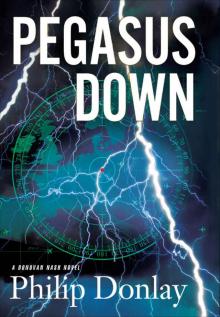 Pegasus Down: A Donovan Nash Thriller (Donovan Nash Thrillers)
Pegasus Down: A Donovan Nash Thriller (Donovan Nash Thrillers)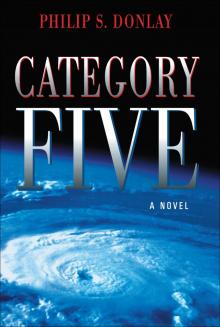 Category Five
Category Five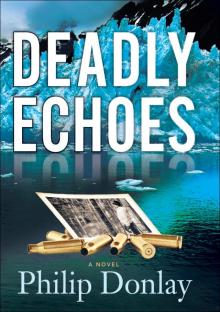 Deadly Echoes
Deadly Echoes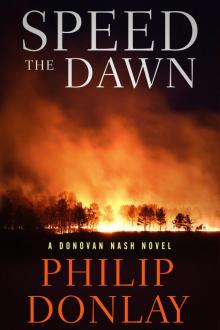 Speed the Dawn
Speed the Dawn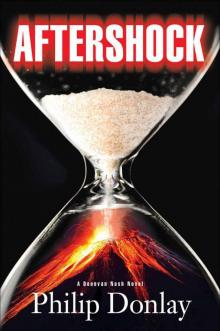 Aftershock: A Donovan Nash Novel (A Donovan Nash Thriller)
Aftershock: A Donovan Nash Novel (A Donovan Nash Thriller)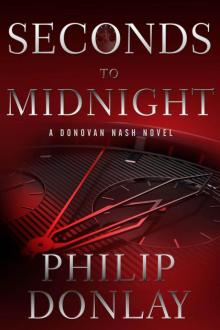 Seconds to Midnight
Seconds to Midnight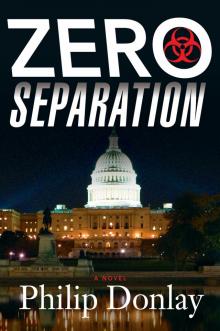 Zero Separation
Zero Separation